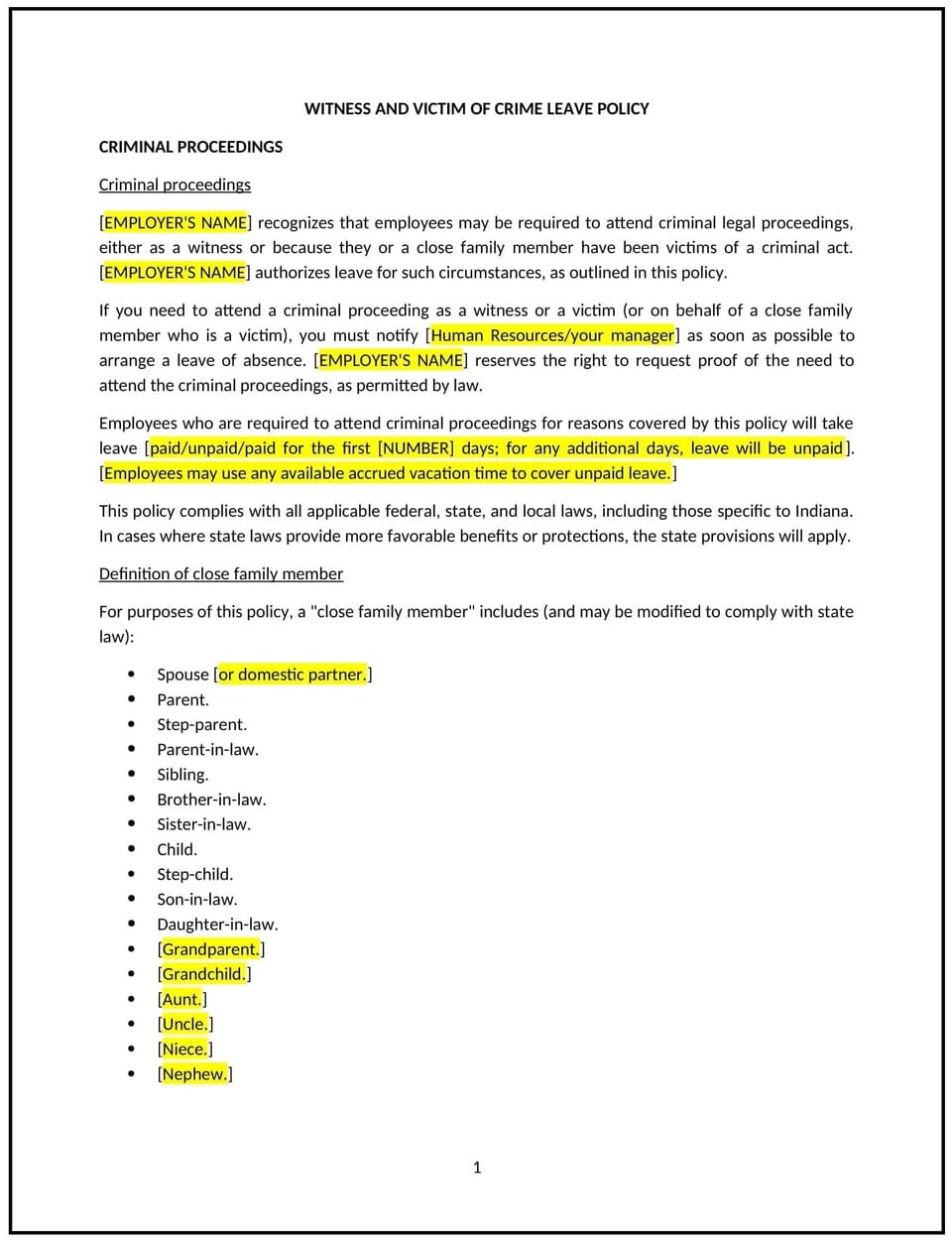Witness and victim of crime leave policy (Indiana): Free template

Witness and victim of crime leave policy (Indiana): Free template
This witness and victim of crime leave policy helps Indiana businesses provide employees with clear guidelines for taking leave to participate in legal proceedings as a witness or victim of a crime. The policy outlines eligibility criteria, procedures for requesting leave, and expectations for maintaining workplace continuity while supporting employees fulfilling their civic responsibilities.
By implementing this policy, Indiana businesses can demonstrate their commitment to supporting employees during challenging times while maintaining operational efficiency.
How to use this witness and victim of crime leave policy (Indiana)
- Define eligibility: Specify which employees are eligible for leave under this policy, including those subpoenaed as witnesses, victims of crimes, or individuals supporting victims (e.g., family members).
- Outline covered activities: Clarify the types of activities covered, such as attending court hearings, providing testimony, or participating in related legal proceedings.
- Provide request procedures: Include instructions for requesting leave, such as notifying a manager, providing advance notice, and submitting any required documentation (e.g., subpoenas or court notices).
- Address pay and benefits: State whether leave under this policy is paid or unpaid and confirm that benefits like health insurance will remain intact during the leave.
- Emphasize confidentiality: Assure employees that any information shared about their involvement in legal proceedings will be handled confidentially.
- Set return-to-work expectations: Outline the process for employees to notify their manager of their return date and resume duties after the leave ends.
- Include job protection: Reinforce that employees taking leave under this policy will not face retaliation or adverse consequences for their absence.
- Review and update regularly: Periodically assess the policy to ensure compliance with Indiana laws and reflect any changes in workplace practices or legal requirements.
Benefits of using this witness and victim of crime leave policy (Indiana)
Implementing this policy provides several key benefits for Indiana businesses:
- Supports employee well-being: Demonstrates empathy and assistance for employees dealing with legal matters as witnesses or victims.
- Enhances compliance: Aligns with Indiana laws that protect employees’ rights to leave for legal obligations.
- Promotes workplace fairness: Establishes consistent rules for handling leave requests related to legal proceedings.
- Maintains continuity: Provides a structured process to manage workloads and operations during employee absences.
- Builds trust: Reinforces a culture of support and fairness, improving employee morale and retention.
- Protects business reputation: Shows commitment to civic responsibilities and compliance with legal obligations.
Tips for using this witness and victim of crime leave policy (Indiana)
- Communicate the policy: Share the policy during onboarding and ensure it is accessible in the employee handbook for easy reference.
- Encourage early notice: Remind employees to notify their manager as soon as possible when they know they need leave for legal proceedings.
- Maintain confidentiality: Ensure that all details regarding the leave request are kept confidential and shared only with relevant personnel.
- Monitor compliance: Stay informed about Indiana laws protecting employees' rights to leave for legal obligations to ensure ongoing compliance.
- Provide flexibility: Work with employees to accommodate their leave needs while minimizing operational disruptions.
- Offer support resources: Consider providing information about counseling or employee assistance programs for employees dealing with crime-related trauma.
Q: What types of activities are covered under this policy?
A: Covered activities include attending court hearings, providing testimony, participating in depositions, or supporting a victim as required by legal proceedings.
Q: Is leave under this policy paid or unpaid?
A: This depends on the business’s policy. Employers may choose to offer paid leave, unpaid leave, or require employees to use accrued paid time off.
Q: How should employees request leave under this policy?
A: Employees should notify their manager as soon as possible and provide documentation, such as a subpoena, court notice, or other official documents.
Q: Are employees protected from retaliation for taking leave under this policy?
A: Yes, employees are protected from retaliation or adverse consequences for taking leave as a witness or victim of a crime.
Q: How should businesses handle extended absences due to legal proceedings?
A: Businesses should work with employees to manage their responsibilities during extended absences and plan for their return once the proceedings are complete.
Q: Do employees need to provide proof of their involvement in legal proceedings?
A: Yes, employees should provide appropriate documentation, such as a subpoena or court notice, to verify their need for leave.
Q: Can employees use paid time off for witness or victim leave?
A: This depends on the business’s policy. Employers may allow or require employees to use accrued paid time off for this type of leave.
Q: How often should this policy be reviewed?
A: The policy should be reviewed annually or whenever there are changes to Indiana laws or business practices related to leave policies.
This article contains general legal information and does not contain legal advice. Cobrief is not a law firm or a substitute for an attorney or law firm. The law is complex and changes often. For legal advice, please ask a lawyer.


